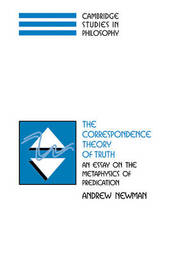
|
The Correspondence Theory of Truth: An Essay on the Metaphysics of Predication
Paperback / softback
Main Details
| Title |
The Correspondence Theory of Truth: An Essay on the Metaphysics of Predication
|
| Authors and Contributors |
By (author) Andrew Newman
|
| Series | Cambridge Studies in Philosophy |
|---|
| Physical Properties |
| Format:Paperback / softback | | Pages:264 | | Dimensions(mm): Height 229,Width 152 |
|
| Category/Genre | Philosophy - epistemology and theory of knowledge |
|---|
| ISBN/Barcode |
9780521009881
|
| Classifications | Dewey:121 121 |
|---|
| Audience | | Professional & Vocational | |
|---|
| Illustrations |
Worked examples or Exercises
|
|
Publishing Details |
| Publisher |
Cambridge University Press
|
| Imprint |
Cambridge University Press
|
| Publication Date |
17 May 2007 |
| Publication Country |
United Kingdom
|
Description
This work presents a version of the correspondence theory of truth based on Wittgenstein's Tractatus and Russell's theory of truth and discusses related metaphysical issues such as predication, facts and propositions. Like Russell and one prominent interpretation of the Tractatus it assumes a realist view of universals. Part of the aim is to avoid Platonic propositions, and although sympathy with facts is maintained in the early chapters, the book argues that facts as real entities are not needed. It includes discussion of contemporary philosophers such as David Armstrong, William Alston and Paul Horwich, as well as those who write about propositions and facts, and a number of students of Bertrand Russell. It will interest teachers and advanced students of philosophy who are interested in the realistic conception of truth and in issues in metaphysics related to the correspondence theory of truth, and those interested in Russell and the Tractatus.
Reviews'Andrew Newman's ... book ... bursts at the seams with details and extremely informative discussions of the nature of facts and propositions, 'Truth-maker' accounts, predication and properties. It will be of definite interest to anyone thinking about the history and underlying metaphysics of this most classical of truth theories.' The Philosophical Quarterly
|